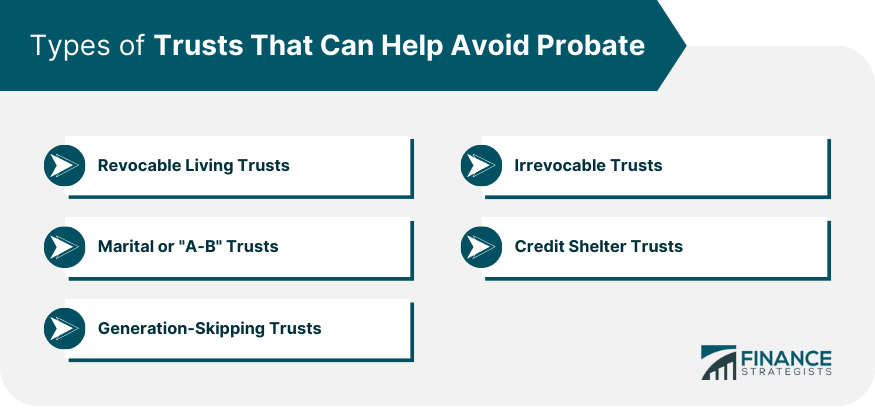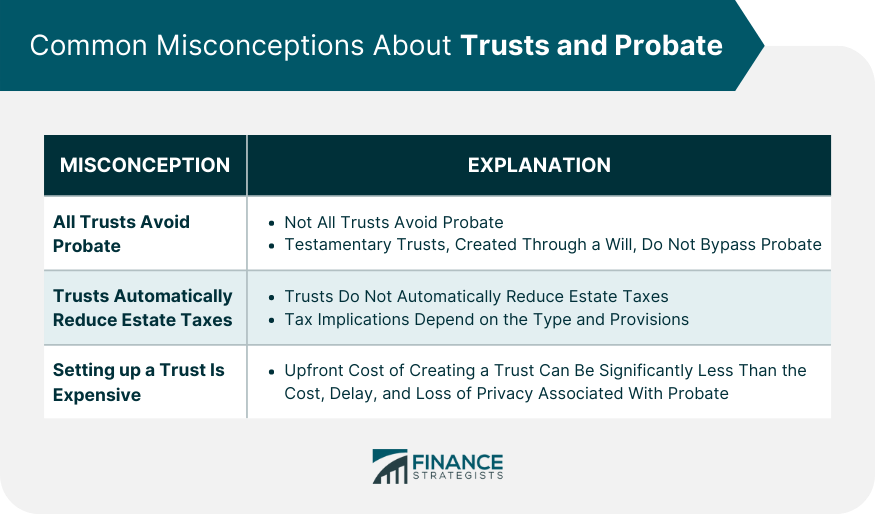Yes, a properly set up and funded trust can avoid probate. When assets are placed into a trust, they are legally owned by the trust, not the individual. Therefore, upon the individual's death, these assets are not subject to the probate process. Instead, the designated trustee manages the distribution of assets directly to the named beneficiaries as per the terms of the trust. This process allows for a faster, more private distribution of assets compared to probate. However, it's important to note that not all types of trusts can avoid probate - for instance, testamentary trusts, which are created through a will, do not bypass probate. Proper legal advice is advised to ensure the trust is set up correctly.
Assets in a trust are managed by the trustee. They are responsible for maintaining the assets, making investment decisions, and, upon the grantor's death, distributing the assets to the designated beneficiaries according to the trust's terms. When assets are placed in a trust, their ownership is transferred from the individual to the trust. This means that upon the individual's death, the assets are not considered part of the deceased's estate for probate purposes and can bypass probate. Consider two scenarios: one where a deceased person has trust in place and one without. In the former scenario, the trust assets can be transferred to beneficiaries almost immediately after death. In contrast, without a trust, the estate must go through probate, which can be a lengthy and expensive process. Several types of trusts can help avoid probate, offering a quicker and more private means of transferring assets upon death. Here are a few: Also known as inter vivos trusts, are created during the trust maker's lifetime. The trust maker can alter, change, modify, or revoke the trust at any time. Upon their death, the trust becomes irrevocable, and the successor trustee distributes the assets to the beneficiaries as per the trust terms, bypassing probate. Once created, these trusts cannot be altered or revoked without the consent of the beneficiaries. Transferring assets into this kind of trust removes them from the trust maker's taxable estate, meaning they're not subject to probate or estate taxes. These are designed to provide benefits to a surviving spouse while also making the most of estate tax exemptions. They can bypass probate but involve more complexity. These trusts allow the trust maker to dictate how their assets are distributed beyond the spouse's death and avoid estate taxes. These permit trust assets to be distributed to grandchildren, or later generations, bypassing probate and potentially reducing estate taxes. Not all trusts avoid probate. For instance, a testamentary trust, created through the instructions of a will, does not avoid probate since it comes into existence after the individual's death and the will's validation. While trusts can provide various benefits, they do not inherently avoid or reduce estate taxes. The estate tax implications are determined by the type of trust and the specific provisions it contains. There is a common belief that trusts are costly to establish. While there are costs involved, the upfront cost of creating a trust can be significantly less than the cost, delay, and loss of privacy associated with probate. Joint ownership with the right of survivorship or tenancy by the entirety (for married couples) can avoid probate. When one owner dies, the surviving owner automatically becomes the sole owner of the property. Certain assets allow for beneficiary designations, such as life insurance policies, retirement accounts, and some bank accounts. Upon the owner's death, these assets are directly transferred to the designated beneficiaries, avoiding probate. Payable on Death (POD) or Transfer on Death (TOD) arrangements are available for bank accounts and securities, respectively. These assets will be transferred directly to the named beneficiaries upon the owner's death, bypassing probate. While it is possible to establish trust on your own, professional legal advice is often beneficial to ensure your trust is correctly set up to meet your specific needs and to fully take advantage of the potential benefits. An attorney can provide guidance on the appropriate type of trust for your situation, assist in drafting the trust document, and help transfer assets into the trust. An attorney can also help navigate complex issues, such as estate taxes and potential creditor claims. Trusts serve as effective tools in estate planning to bypass probate, facilitating quicker and more private distribution of assets. They offer control over how and when assets are distributed, with types like revocable living trusts, irrevocable trusts, and various specialized trusts offering probate avoidance. However, not all trusts bypass probate—testamentary trusts, for example, don't offer this advantage. Other probate avoidance methods exist, such as joint ownership and beneficiary designations, each with its own merits. While setting up a trust involves costs, they often outweigh the financial and temporal demands of probate. Misconceptions surrounding trusts underline the importance of professional legal advice. A competent attorney can guide you through the process, helping you choose the right trust for your circumstances, navigate potential tax implications, and ensure your assets are correctly transferred into the trust.Does a Trust Avoid Probate?
Mechanism of Trusts in Avoiding Probate
How Assets Are Managed in a Trust
Transfer of Ownership in a Trust
Trusts vs No Trusts in Probate
Types of Trusts That Avoid Probate
Revocable Living Trusts
Irrevocable Trusts
Marital or "A-B" Trusts
Credit Shelter Trusts
Generation-Skipping Trusts

Common Misconceptions About Trusts and Probate
“All Trusts Avoid Probate”
Trusts and Estate Taxes
Cost of Setting up a Trust

Other Methods of Avoiding Probate
Joint Ownership
Beneficiary Designations
Payable on Death and Transfer on Death Arrangements
Consultation With Estate Planning Experts
Importance of Legal Advice
How an Attorney Can Help
Bottom Line
Does a Trust Avoid Probate? FAQs
Probate is the legal process of distributing a deceased person's assets and settling their estate. It can be time-consuming, expensive, and public, which is why many people prefer to avoid it. Avoiding probate allows for a faster and more private transfer of assets to beneficiaries.
No, not all types of trusts can help avoid probate. Testamentary trusts, which are created through a will and come into effect after the individual's death, do not bypass probate. It's important to choose the right type of trust, such as a revocable living trust or an irrevocable trust, to achieve probate avoidance.
Yes, there are alternatives to trusts for avoiding probate. Joint ownership with the right of survivorship and beneficiary designations on certain assets like life insurance policies and retirement accounts can also bypass probate. Payable on Death (POD) and Transfer on Death (TOD) arrangements for bank accounts and securities, respectively, are additional methods to avoid probate.
No, trusts do not automatically reduce estate taxes. The estate tax implications depend on the type of trust and its specific provisions. Certain types of trusts, like credit shelter trusts or generation-skipping trusts, can help minimize estate taxes, but it's important to consult with an attorney to understand the tax implications of a trust.
While it is possible to establish a trust without an attorney, it is highly recommended to consult with an attorney who specializes in estate planning. An attorney can provide guidance, ensure the trust is set up correctly, draft the trust document, assist with asset transfer, and address complex legal and tax issues associated with trusts and probate.
True Tamplin is a published author, public speaker, CEO of UpDigital, and founder of Finance Strategists.
True is a Certified Educator in Personal Finance (CEPF®), author of The Handy Financial Ratios Guide, a member of the Society for Advancing Business Editing and Writing, contributes to his financial education site, Finance Strategists, and has spoken to various financial communities such as the CFA Institute, as well as university students like his Alma mater, Biola University, where he received a bachelor of science in business and data analytics.
To learn more about True, visit his personal website or view his author profiles on Amazon, Nasdaq and Forbes.











